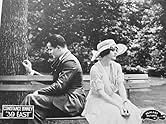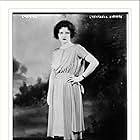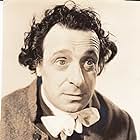Rachel Crothers was an extremely popular American playwright of the early 20th century, whose appeal faded before World War Two. (Her name is mentioned in MGM's 1939 musical 'Babes in Arms', but only because lyricist E.Y. Harburg needed a rhyme for 'Marx Brothers'.) Crothers tended to write brittle comedies of manners about jaded socialites, and her work has dated so badly that it is almost never revived. Her most atypical work was her 1927 science-fiction play 'Venus', a bizarre comedy about a scientist who invents a formula that makes men more female and women more male: the play ends with two androgynous aviators boarding his-'n'-hers aeroplanes and flying to Venus. Even THAT play has dated.
'39 East' is a more typical Crothers comedy, with the misfortune to possess a premise very similar to that of the later 'Stage Door', a much better comedy. The title refers to a Manhattan boarding-house, a few blocks east of the Broadway theatre district. Penelope Penn is an ingenue from the sticks, the daughter of a country vicar; she sang in his choir, and her voice is so good that she's come to New York City in the hope of getting a job in some big-city choir that will pay her enough money to put her younger brothers through college. Can anyone actually be *that* naive? Anyway, Penelope Penn (inevitably nicknamed 'Penny') soon learns that big-paying chorister jobs are a bit thin on the ground. Conveniently, this goodie-good girl is also a helluva dancer, and she soon gets a job in the chorus line of a Broadway musical, produced by hotshot showman Timothy O'Brien ... not enough to put her brothers through college, but enough to pay the rent at 39 East.
SPOILERS THROUGHOUT. The boarding-house is packed to the gills with curtain-twitching old biddies, who have nothing better to do than sit in the lobby and gossip about other people. Penelope is an attractive young maiden who works as a chorus girl, so the biddies make up their minds she must be a slut. (The intertitles phrase this delicately but make the implications clear.) Meanwhile, Penny crosses paths with a suave young man who rejoices in the name Napoleon Gibbs. He's the son of a wealthy and socially prominent family, and he's blazed a trail through all the sweet young things in Manhattan. Penny is attracted to Napoleon Gibbs (possibly failing to notice his peculiar name because his wallet is blocking the view), so she agrees to meet him in Central Park. There's some amusing slapstick between Penny and Napoleon on a park bench. But some Hollywood set designer did a bad job here: the exterior sequences, supposedly filmed in Central Park in New York, look a lot more like Griffith Park in Los Angeles. Despite his family's wealth, Gibbs wants to collect another Penny: he gets a bit physical with our heroine, who flees in disgust, causing a faintly amusing run-in with a policeman.
Meanwhile, the biddies at 39 East are planning their own amateur concert: this might have been funny in the original stage play, but in a silent film (where we can't hear how bad they are) it doesn't work. On the rebound from Napoleon's attempt to seduce her, Penny seeks comfort from O'Brien ... who promptly makes his OWN attempt to seduce her, even though he's married. Just when Penny realises she can't trust ANY man, young Napoleon realises that he genuinely loves Penny, and she's more than just another notch on his bedpost. Happy ending, I guess.
There are some good performances here, notably by Alison Skipworth as the droll landlady of 39 East, and by Luis Alberni (bereft of his usual funny-foreigner accent in this silent movie). The plot is dull, unconvincing and clichéd, with two major problems that are never addressed. Firstly: even in 1920, it's difficult to believe that any adult woman could be quite so naive and sheltered as Penelope Penn. (The fact that her father is a preacher is no excuse: clergymen are familiar with sin, because they encounter it all the time.) Secondly, because Napoleon Gibbs comes from a wealthy and prominent family, we can't help wondering if Penny's attraction to him mightn't be entirely romantic. The first problem worsens the second: as Penny is just *too* innocent to be plausible, I kept expecting her to turn out to be a gold-digger who is merely coming the raw prawn (acting naive) to snatch Napoleon's money. This turns out not to be true: she's the genuine article, which makes this movie very fake. I'll rate '39 East' 3 points out of 10.








